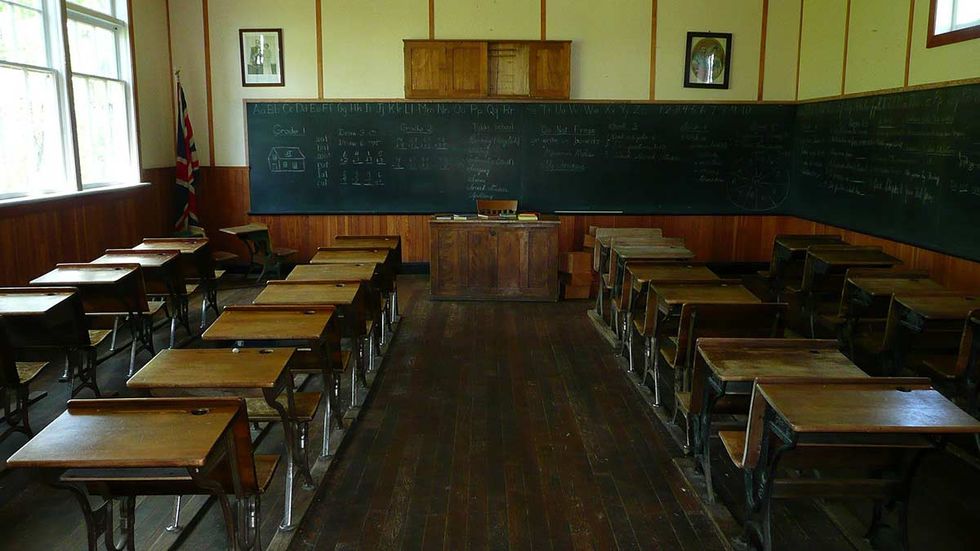
© 2025 Blaze Media LLC. All rights reserved.
A 40-year-old funding fight that touches questions of the proper separation of government powers has reached fever pitch in the state of Kansas. The state Supreme Court has threatened to shut down public schools should the state legislature fail to appropriate an additional $38 million in funds by the court mandated deadline of June 30.
The court ruled in May that the state’s $4 billion block grant appropriation of school funding was “inequitable and unconstitutional,” giving the legislature its deadline to rework the school financing. The court issued its proclamation at 4:55pm on the Friday before Memorial Day weekend, the last weekend before the legislature adjourned for 2016.
The block grant program was adopted as a temporary replacement of a decades old program of school finance that was causing automatic spending increases Kansas Republicans deemed wasteful. In scrapping the old program for a block grant program, the court decided Governor Brownback and the Kansas legislature had violated the state constitution.
Governor Brownback has proclaimed a special session of the legislature to begin June 23 — two weeks from now, to resolve the finance issue. In a statement released by the Governor’s office, Brownback said it was “distressing that the Kansas Supreme Court has put the schools and legislature of Kansas in this position over less than 1 percent of school funding.”
The Legal Problem
The Supreme Court found that Governor Brownback’s block grant funding program violated the Kansas state constitution because it did not provide “equitable and adequate” funding for Kansas schools.
Article 6, Section 6 of the Kansas constitution requires that “The legislature shall make suitable provision for finance of the educational interests of the state.” Historically, the courts in Kansas have defined the word “suitable” to mean “equitable and adequate.”
The Wichita Eagle, reporting on the court’s May decision, explained how the court decided Governor Brownback’s block grant program didn’t meet the “equitability requirement” of the Kansas constitution.
“The reason was that it contained a “hold harmless” provision that guaranteed the bill wouldn’t reduce local option budget funding for any school district, although the vast majority wouldn’t get any more. The local option budget, or LOB, is money that voters can elect to tax themselves to provide extra funding for their own schools.
Inequity creeps in because property-rich districts can easily raise large sums of money with relatively small increases in their tax rate. Not so for the poor districts, where it takes a large jump in property tax rates to generate comparable income for the schools.”
"It is unfortunate that the Kansas Supreme Court has put at risk the education of Kansas students and livelihood of teachers across the state by threatening to close schools on June 30,” Kansas Governor Sam Brownback said in a statement. “The court is engaging in political brinksmanship with this ruling, and the cost will be borne by our students.”
The Funding Fight
Governor Brownback’s administration has been characterized by fiscal restraint. The growth of government spending in Kansas was reduced to 1.7%, which is less than half of the growth rate under Brownback’s predecessor, Democrat Kathleen Sebelius. Executive agency employees were reduced 25% and Brownback slashed cabinet level spending across the board.
And Brownback’s administration accomplished this while signing into law the largest tax cut in the state’s history.
Yet education has remained a top priority of Brownback’s administration and education funding has remained at record levels despite cuts to spending elsewhere.
In his 2015 State of the State address, Governor Brownback issued a call to reform the school finance process. “For decades now, Kansas has struggled under a school finance formula which is designed not to be understood,” the Governor said. “A formula designed to lock in automatic, massive increases in spending unrelated to actual student populations or improved student achievement.”
Governor Brownback’s office provided Conservative Review with a copy of the archaic and complex formula used to determine school finance appropriations in the state of Kansas, for much of the past 20 years.
In his State of the State, Brownback called for a “timeout in the school finance wars,” a repeal of the old formula, and he proposed a simple program of block-grant funding for two years as a temporary solution to the state’s education finance woes. Brownback’s plan froze school funding at FY 2013-2014 levels until the legislature could develop a new scheme to replace that archaic and confounding mess of a budget formula.
The Republican controlled legislature passed the block grant scheme, and state Democrats assailed them for doing so, accusing the Brownback administration of slashing funds for education. But that’s not accurate.
Kansas is actually investing a record $4 billion in K-12 education. The state spends the 3rd most on education of any state in the country as a percent of the state budget: 50%. Kansas spends about $1000 more per pupil than the national average of state education spending. Increases in education funding have outpaced both inflation and enrollment growth.
The additional $38 million the state Supreme Court is ordering is less than 1% of the funds already appropriated to Kansas schools.
The specific fund in question, Local Operating Budget Equalization, goes to property tax relief, which does not affect the ability of schools to fund their classroom operations. It is this particular fund that the Supreme Court says is creating the “inequitably” that violates Kansas’ state constitution.
A Separation of Powers Issue
At the heart of the matter is a simple question. What does “suitable funding” mean? And which branch of government gets to answer that question?
Responding to a request for comment, Eileen Hawley, a spokeswoman for the governor, said “other courts have faced a similar question. The Texas Supreme Court correctly recognized that the Constitution guarantees the power of the purse to the Legislature, stating ‘accordingly, we decline to usurp legislative authority by issuing reform diktats from on high, supplanting lawmakers’ policy wisdom with our own.”
Supporters of Governor Brownback’s block grant scheme argue it is the legislative branch, the branch invested with the power of the purse, that should decide what funding is “suitable” when it appropriates funds.
Governor Brownback has indicated he is open to the legislature granting the court’s request for an additional $38 million in funds, though he views the excess government spending as unnecessary. Yet his administration seems to wish to keep in mind the constitutional separation of powers, telling Conservative Review that the governor would “welcome any alternatives that the legislature may propose.”
Hawley added, however, that it is “unlikely that the Court will uphold any action without an increase in funding.”
Want to leave a tip?
We answer to you. Help keep our content free of advertisers and big tech censorship by leaving a tip today.
Want to join the conversation?
Already a subscriber?
more stories
Sign up for the Blaze newsletter
By signing up, you agree to our Privacy Policy and Terms of Use, and agree to receive content that may sometimes include advertisements. You may opt out at any time.
© 2025 Blaze Media LLC. All rights reserved.
Get the stories that matter most delivered directly to your inbox.
By signing up, you agree to our Privacy Policy and Terms of Use, and agree to receive content that may sometimes include advertisements. You may opt out at any time.





